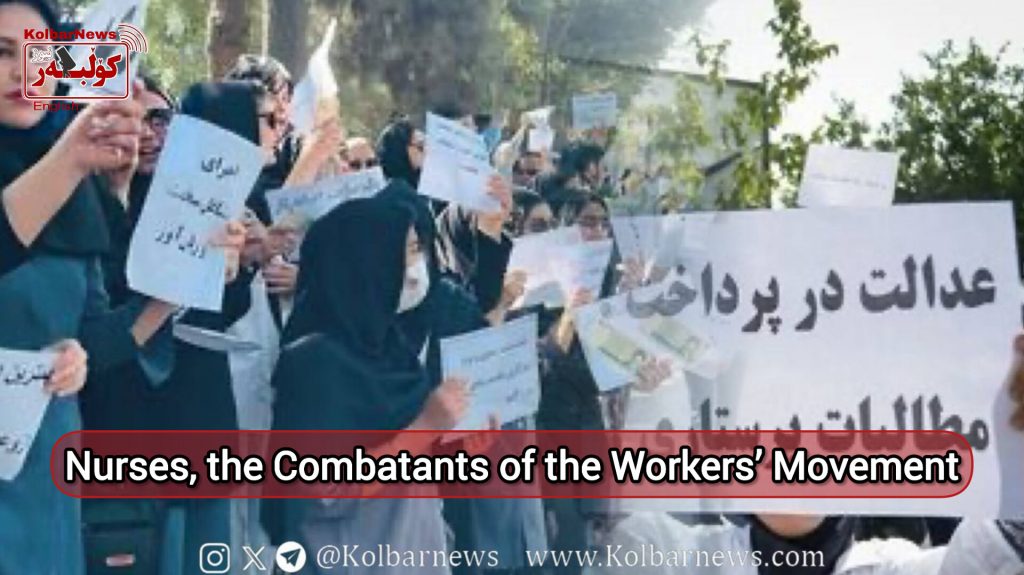
On Thursday, November 7, marking the global anniversary of the Great October Revolution, Iran also observes Nurses’ Day. Since the previous Saturday, nurses have launched a new wave of strikes and protest gatherings in several cities, raising slogans to voice their demands. Some of these slogans include: “Unite today for a better tomorrow!” “Enough with war-mongering, our tables are empty,” “One less embezzlement and we’ll get our dues,” “No shifts until we get our rights,” “We’ve heard many promises, but received no answers,” “We are the symbols of patience, but our patience has run out!” “End mandatory overtime and adjust fair compensation for it,” “Nurses, shout for your rights!” “A nurse may die, but won’t accept humiliation,” “We fought COVID, received no support,” and “Unity and nationwide protest are the keys to our victory!”
The nurses demand an end to pay discrimination within the healthcare sector, increased wages and benefits, better working conditions, the fulfillment of overdue payments, and improved welfare standards. They have declared that the consequences of their strikes and protests rest on the shoulders of the authorities. Additionally, they voiced opposition to the threats, insults, and harassment directed at nurses by officials, chanting “Incompetent officials, resign!” to demand an end to oppression, discrimination, and threats.
The nurses began their protests and strikes on April 9 this year, repeatedly giving authorities time to address their demands but halting their efforts when promises were unmet. The officials within the health and medical system, plagued by discrimination and corruption, have done nothing but make empty promises to the striking nurses. In response, the protesting nurses continued their movement with slogans like “We are the loneliest group, tired of promises,” and “Enough with promises; our tables are empty.” Alongside, female nurses have also faced the added burden of gender-based discrimination and a deeply entrenched religious patriarchy. Security forces, together with authorities, have tried to discourage nurses from protesting further by making empty promises, resorting to traditional repressive methods, and detaining them. However, the ongoing strikes and protests show that these measures have failed.
The protesting nurses have gained support from organized labor groups, retirees, and teachers. These groups have shown solidarity with the nurses’ demands through statements, speeches, and other expressions, criticizing the government’s treatment of the nurses. The Coordination Committee for Helping to Form Workers’ Organizations, the Haft-Tappeh Sugarcane Workers Syndicate, and the Alliance of Retirees and Workers in Khuzestan have issued a joint statement backing the nurses. They expressed their solidarity and support for the nurses’ demands, stating: “Many of these demands for wages, living conditions, and welfare are our shared struggle as workers, retirees, teachers, and other wage-earners.” Retirees in various cities also voiced their support for the protesting nurses and healthcare workers during their own rallies. The Iran Human Rights Campaign, referring to the nurses’ month-long protests and strikes, called on the Iranian government to respect the rights of nurses and healthcare workers, who are vital to public health.
The International Council of Nurses (ICN) expressed deep concern over the arrests and unjust sentences given to protesting nurses in Iran, emphasizing that nurses have the right to protest without fear of arrest or harassment. The ICN urged the government to address the causes of dissatisfaction and find fair solutions to their issues.
Currently, 220,000 nurses work in hospitals and healthcare centers in Iran, with over 90 percent reportedly dissatisfied, according to some officials. A segment of this workforce has chosen to migrate, welcomed by other countries with higher pay, educational opportunities, and additional benefits. However, most of them remain and have committed to providing honest service to citizens while demanding their rights.
Nurses, as a vital part of the working class and holders of an essential profession, are also organizing through their daily struggles. The simultaneous strikes and protests across different cities, along with their shared demands, reflect this necessary effort. The organizational outcomes of these actions will enable male and female nurses to unite more consciously with other right-seeking and militant workers. This collective movement, unfolding through the struggles of working women, courageous claimants of justice, and other activists, could lead to the end of the Islamic Republic. The next step should be the establishment of a people’s government, where work would not be an obligation but a fundamental human need directed at fostering creativity and growth.

